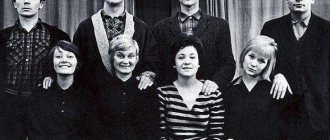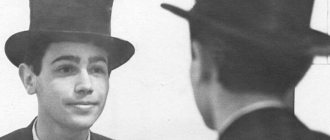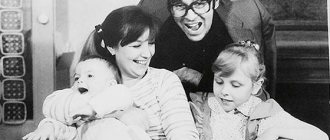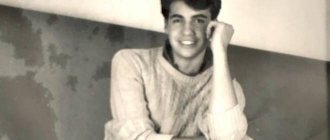Biography
Roman Tkachuk was born on August 31, 1932 in Sverdlovsk, and later moved to Tashkent with his parents.
In 1955, he graduated from the directing department of the Tashkent Technical Institute named after A. N. Ostrovsky and in the same year became an actor at the Tashkent RDT named after M. Gorkovy, where he later made his debut as a director. In 1965, Roman Tkachuk was accepted into the Capital Theater of Satire, where he emerged as a striking actor, especially good in dramatic and tragicomic roles, and became one of the leading actors of a troupe rich in talent. “In his characters,” said Alexander Shirvindt, “whether they were smug scoundrels or stupid simpletons, there were always notes of lyrical sadness, melancholy and disorder.”
Roman Tkachuk made his cinematic debut in 1956 with the role of Zhenya Panko in the film “Meet Me at the Stadium.” The actor gained all-Union fame for his role as Pan Vladek in the TV series “Zucchini “13 Chairs””, for which Tkachuk was awarded the title of Honored Cultural Worker of Poland in 1976.
At the end of 1993, the actor’s wife, Maya Gnezdovskaya, fell seriously ill. On January 9, 1994, she was taken home from the clinic, and on the night of January 10, she died. The actor survived her by only a few hours. He was buried along with his wife at the Dolgoprudnenskoye (Central) cemetery (site No. 77).
KisTv
08/31/1932, Sverdlovsk – 01/10/1994, Moscow
People's Artist of the Uzbek SSR (1964)
Honored Worker of Polish Culture (1976)
Laureate of the State Prize of the RSFSR (1977)
Tashkent
Roman Tkachuk was born on August 31, 1932 in Sverdlovsk. Later he and his parents moved to Tashkent. In those years, Tashkent was the cultural center of Soviet Central Asia. Interesting performances were staged in local theaters and bright artists worked. Roman also became “infected” with the scene. In 1955, he graduated from the directing department of the Tashkent Theater and Art Institute. A. N. Ostrovsky. And two years earlier, the young actor began playing at the Tashkent Russian Drama Theater. Gorky. Very soon Roman Tkachuk became a local celebrity, playing both comedic and dramatic roles. His heroes were: a broken hooligan in Zak and Kuznetsov’s sad play “Two Colors”, a strict naval officer in Stein’s “Ocean”, Fortinbrass in Shakespeare’s “Hamlet”, Raskolnikov in Dostoevsky’s “Crime and Punishment”. Spectators eagerly attended performances with his participation. One of the spectators of those years, Pavel Podkladov, recalls: “For some reason, I immediately remembered the pop-eyed, smiling guy with a characteristic soft talk. (Now I see him as a boy, but then he seemed simply a celestial being!) The actor was so charming and truthful (a theater critic would write - organic) that it took a lot of effort not to give in to temptation and not start a dialogue with him from the audience, otherwise and rush onto the stage like a “bosom buddy.” He had some kind of incredible attractiveness, magnetism, as they would say now - charisma. And he was a real premiere of the theater and an idol of the multinational Tashkent public. Although, I will note without false modesty that in those years at the Theater. Gorky worked with many wonderful and even unique artists. <…> ...they didn’t offend him with roles. And the fans pay attention too. After the performance, a lot of admirers always crowded around the service entrance to the theater on Karl Marx Street to get at least a glimpse of the idol. He left the theater without showing off, absolutely “without showing off,” as today’s youth say. Of course, he had a sense of self-esteem, but it was not mixed with arrogance, but with the consciousness that he was doing his job well, talentedly, without fools...” Roman Tkachuk worked in Tashkent for ten years and rightfully earned the title of People’s Artist Uzbek SSR. When the provincial framework became too small for his talent, he moved to Moscow...
Theater of Satire
In 1965, Roman Tkachuk became an actor at the Moscow Satire Theater. Despite his stellar surroundings, he quickly settled into the team. One of his first works was the role of Prisypkin in Mayakovsky’s “The Bedbug,” then Tkachuk received a role in Grigory Gorin’s play “Phenomena.” Later there were: Svistunov in the play “Shadow” by Saltykov-Shchedrin, the gardener Antonio in the famous production of “The Marriage of Figaro”, Don Juan in the play “Don Juan, or the Love of Geometry”, Chudakov in “Bath”, Poludushkin in “Foam”, Orgone in Tartuffe. The famous Alexander Shirvind, who worked on the same stage with Roman Denisovich, spoke about him this way: “Tkachuk revealed himself as a bright character actor, most organic in the images of dramatic and tragicomic sound. In his characters, whether they were smug scoundrels or stupid simpletons, there were always notes of lyrical sadness, melancholy and disorder.” The pinnacle of Roman Tkachuk’s work was the role of Podsekalnikov in Nikolai Erdman’s “The Suicide,” directed by Valenitin Pluchek. This is how Pavel Podkladov described this work: “...the funny and unhappy Podsekalnikov evoked a lot of different feelings: laughter, emotional sympathy, and pity. Perhaps, only in “Suicide” did the artist finally manage to fully demonstrate his subtle lyrical and comedic gift. I remember that I sat quite close to this performance, and I still can’t forget the eyes of the unfortunate Podsekalnikov, in which there shone an inexpressible hopelessness, the despair of a little man who, like an animal, is “driven merrily to numbers” ... "
Zucchini 13 chairs
In the 70s, the humorous television program “Zucchini 13 Chairs” enjoyed great success among viewers. The main roles in the program were performed by artists from the Satire Theater. Among them, Roman Tkachuk shone. In "Zucchini" Tkachuk played the role of Mr. Vladek, the stupid but charming husband of Mrs. Teresa. This image was loved not only by domestic but also by Polish viewers, thanks to which the actor was awarded the title of Honored Worker of Polish Culture.
Movie
Roman Tkachuk acted in many films. Usually these were supporting roles, but he tried to put some zest into each episode, which gave his characters a special shine. The following remains in the memory of the audience: the sad drunkard of the club manager Gennady Nikolaevich Pazdnikov in the popular detective trilogy “Village Detective”, “Aniskin and Fantomas”, “And Aniskin Again”; the stern, but at the same time slightly funny Commissioner Zaplatin in the comedy “Bumbarash”; poacher Egor Egorovich Pantyukhov in the comedy “You for me, I for you”; funny patient Nikolai Nikolaevich Persikov in the film adaptation of Bulgakov’s “Heart of a Dog.” The actor also has more serious works to his credit: Peter the Great in “The Ballad of Bering and His Friends,” Major General Alexey Epishev in the film epic “Liberation.” A special place in the work of Roman Tkachuk is occupied by his roles in children's films. As you know, children do not forgive falsehood, and it is in such films that acting talent is tested. The golden fund of domestic cinema includes films with Tkachuk’s participation: “Cipollino” (Mastino the Dog), “Smart Things” (Tsar), “Stories about Keshka and His Friends” (house manager Yakov Grigorievich), “Vesnukhin’s Fantasies” (painter), “ The Rings of Almanzor" (Prince Aldebaran). Roman Tkachuk played his last film role in the film adaptation of Mikhail Bulgakov’s famous novel “The Master and Margarita.” The doorman in Griboyedovo became his hero. However, the actor never saw this picture...
Together…
People who knew Roman Tkachuk’s family closely noted that he simply idolized his wife Maya Gnezdovskaya. Together they lived a long, happy life. At the end of 1993, Maya Gnezdovskaya became seriously ill. Roman Denisovich was very worried about this. On January 9, 1994, she was taken home from the hospital, and on the night of January 10, Maya Gnezdovskaya died. Roman Denisovich survived her by only a few hours. They were buried together at the Dolgoprudnenskoye (Central) cemetery (site No. 77).
Creation
Roles in the theater
Theater of Satire
- 1965 - “The Bedbug” by V.V. Mayakovsky - Prisypkin and Doctor (input)
- 1966 - “Don Juan, or the love of geometry” by M. Frisch - Don Juan
- 1967 - “Bathhouse” by V.V. Mayakovsky - Chudakov
- 1967 - “Intervention” by L. Slavin; director V. Pluchek - Filka the anarchist
- 1969 - “A Crazy Day, or The Marriage of Figaro” by P. Beaumarchais; director V. Pluchek - Count Almaviva and gardener Antonio
- 1971 - “Temp-1929” based on the works of N. Pogodin; director M. Zakharov - Grigory Gai
- 1972 - “Mother Courage and Her Babies” by B. Brecht; director M. Zakharov - Priest
- 1973 - “Eccentric Man” by V. Azernikov; director M. Zakharov - Director
- "Tartuffe" by Moliere - Orgone
- 1982 - “Suicide” by N. R. Erdman; director V. N. Pluchek - Podsekalnikov
- 1984 - “The Cherry Orchard” by A. P. Chekhov - Simeonov-Pishchik
Works on television
- “Zucchini 13 Chairs” - Mr. Vladek
- 1977 - “Who is who?” (television play) - Oleg Vasilievich Shchagin, housing office accountant
Filmography
- 1956 - Meet me at the stadium
- 1956 - In the name of happiness - student
- 1957 - An incident in the desert - border guard
- 1966 - In the town of S. - Volsky
- 1966 - Katerina Izmailova - little man
- 1966 - Darling - Vasily Andreevich Pustovalov
- 1966 - Rainbow formula - Kozdolevsky, director of the research institute
- 1968 - Two comrades served - officer
- 1968 - Village detective - Pozdnyakov, club manager
- 1969 - Golden Gate - God and the Peasant
- 1970 - Liberation - Major General Epishev
- 1970 - Ballad about Bering and his friends - Peter I
- 1970 - Step from the roof - guardsman
- 1971 - Bumbarash - Zaplatin
- 1973 - The Romashkin Effect - Vasily Vasilyevich Romashkin
- 1973 - Smart Things - Ruler
- 1973 - Cipollino - dog Mastino
- 1974 - Stories about Keshka and his friends - house manager
- 1974 - Aniskin and Fantomas - Pozdnyakov, head of the club
- 1974 - Once alone - Dumchenko, head of the club
- 1974 - Lev Gurych Sinichkin - Semyon, Borzikov's valet
- 1974 - Did you call the doctor? - chairman of the workshop committee
- 1975 - We didn’t go through this - Mitya’s father
- 1975 - Escape from the Palace - Taras Tarasovich
- 1975 - Between heaven and earth - warrant officer Petro Golovko, cameo
- 1976 - You are for me, I am for you! — Pantyukhov
- 1977 - Vesnukhin's Fantasies - painter
- 1977 - The Rings of Almanzor - Prince Aldebaran
- 1978 - A chest of drawers was driven through the streets - Anton Antonovich
- 1978 - And again Aniskin - Pozdnyakov, head of the club
- 1980 - Piggy Bank - Cordenbois
- 1982 - Family Affair - Roman Brevdo
- 1986 - We're sitting great! — Pyotr Erofeevich
- 1988 - Heart of a Dog - Doctor Persikov
- 1990 - My husband is an alien - a neighbor
- 1991 - Portrait of Mademoiselle Targi - Sovereign Targi
- 1991 - When they are late for the registry office... - Kokin, Timofey’s father
- 1992 - Hermit
- 1993 - The lanky-legged ones will be the first to enter - episode
- 1994 - The Master and Margarita - Nikolai, doorman in Griboedov
- 1990 - Bale!
Voice acting for cartoons
Childhood and youth
The artist was born in Sverdlovsk on August 31, 1932. During difficult war times, the family moved to the “grain-producing” Tashkent, and Roman spent his childhood and youth there, and his professional development began. During the war years, the capital's actors, poets and musicians were evacuated to the capital of Uzbekistan, and therefore the city became a kind of cultural capital.
Roman Tkachuk in his youth (still from the film “An Incident in the Desert”)
Here the young man graduated from the Theater and Art Institute, receiving a degree in directing, and remained to work at the theater. M. Gorky. True, he began his career not as a director, but as a performer. Despite the fact that the young man was not distinguished by his beauty, he had more than enough talent and courage, which turned any of his images into small masterpieces.
Creativity[ | ]
Theater roles[ | ]
Tashkent Theater of the Soviet Army (1953-1958)
- Prisypkin (“The Bedbug” by V.V. Mayakovsky), etc.;
staged “Wonderful Alloy” by V. M. Kirshon, 1957, etc.)
Tashkent Russian Drama Theater named after. M. Gorky (1958-1965)
- Balaganov (“The Golden Calf” after I. Ilf and E. Petrov),
- Fortinbrass (Hamlet by W. Shakespeare),
- officer (“Ocean” by Stein),
- hooligan (“Two Colors” by Zach and Kuznetsov),
- Raskolnikov (“Crime and Punishment” according to F. M. Dostoevsky),
- Klim Samgin (“The Story of an Empty Soul” based on “The Life of Klim Samgin” by M. Gorky),
- Calvero (“Footlights” based on the script by Charles Chaplin),
- Thodoros (“A Liar Wanted” by D. Psathas, production by Tkachuk).
Staged “Moonlight Sonata” by A. S. Tour (1963)
Theater of Satire
- 1965 - “The Bedbug” by V.V. Mayakovsky - Prisypkin
and
Professor
(input) - 1966 - “Don Juan, or the love of geometry” by M. Frisch, Dir.: Valentin Pluchek - Don Juan
- 1967 - “Bathhouse” by V.V. Mayakovsky - Chudakov
- 1967 - “Intervention” by L. Slavin; director V. N. Pluchek - Filka the anarchist
- 1968 - “The Last Parade” by A.P. Stein, director Valentin Pluchek - Shompolov
- 1969 - “Crazy Day, or The Marriage of Figaro” by P. Beaumarchais; director V. Pluchek - Count Almaviva
and
gardener Antonio - 1970 - “Captive of Time” by A.P. Stein (producing director - Valentin Pluchek) - officer
- 1971 - “Temp-1929” based on the works of N. Pogodin; director M. Zakharov - Grigory Gai
- 1972 - “The Inspector General” by N.V. Gogol, director Valentin Pluchek - Osip, servant
- 1972 - “Mother Courage and Her Children” by B. Brecht; director M. Zakharov - Priest
- 1973 - “Eccentric Man” by V. Azernikov; director M. Zakharov - Director
- 1973 - “Little Comedies of a Big House” by A. M. Arkanov, G. I. Gorin Directors - A. A. Shirvindt, A. A. Mironov - Head of the Housing Office
- 1974 - “The Slap” by Sergei Mikhalkov, Dir.: L. D. Eidlin - Skuratov
- 1975 - “Repair” M. M. Roshchina, Director: Valentin Pluchek - Mitka
- 1975 - “Foam” by Sergei Mikhalkov, director Valentin Pluchek - Poludushkin, the right person
- 1976 - “Woe from Wit” by A. S. Griboyedov, director Valentin Pluchek - Zagoretsky
- 1977 - “Tartuffe, or the Deceiver” by J.-B. Molière, directed by Antoine Vitez (France) - Orgon
- 1979 - “Phenomena” by Grigory Gorin - Klyagin
- 1982 - “Suicide” by N. R. Erdman; director V. N. Pluchek - Podsekalnikov Semyon Semyonovich
- 1982 - “Concert for theater and orchestra” by Grigory Gorin and Alexander Shirvindt, director Alexander Shirvindt
- 1984 - “Farewell, entertainer!” Grigory Gorin, director Andrei Mironov - Sysoev and Lyutikov
- 1984 - “The Cherry Orchard” by A. P. Chekhov - Simeonov-Pishchik
- 1985 - “Be silent, sadness, be silent...” by A. Shirvindt, director A. Shirvindt
- 1987 - “Shadows” by M. Saltykov-Shchedrin, director A. Mironov - Ivan Mikheich Svistikov
- 1988 - “Passion of the Black Sea” by Fazil Iskander, director Alexander Shirvindt - pensioner
- 1989 - “Tribunal” V.N. Voinovich, director Valentin Pluchek - Prosecutor
- 1992 - “Warm Heart” by A. N. Ostrovsky, director Valentin Pluchek - Aristarchus, tradesman
Works on television[ | ]
- “Zucchini 13 Chairs” - Mr. Vladek
- 1977 - “Who's Who?” (television play) - Oleg Vasilievich Shchagin, housing office accountant
Filmography[ | ]
- 1956 - Meet me at the stadium - Zhenya Panko
- 1957 - An incident in the desert - border guard
- 1966 - In the city of S. - Volsky
- 1966 - Katerina Izmailova - little man
- 1966 - Darling - Vasily Andreevich Pustovalov
- 1966 - Rainbow formula - Kozdolevsky, director of the research institute
- 1968 - Two comrades served - officer
- 1968 - Village detective - Pozdnyakov, club manager
- 1969 - Golden Gate - God / Peasant
- 1970 - Liberation - Major General Epishev
- 1970 - Ballad about Bering and his friends - Peter I
- 1970 - Step from the roof - guardsman
- 1971 - Bumbarash - Zaplatin
- 1973 - The Romashkin Effect - Vasily Vasilyevich Romashkin
- 1973 - Smart things - Tsar
- 1973 - Cipollino - dog Mastino
- 1974 - Stories about Keshka and his friends - house manager
- 1974 - Aniskin and Fantomas - Pozdnyakov, head of the club
- 1974 - Once alone - Dumchenko, head of the club
- 1974 - Lev Gurych Sinichkin - Semyon, Borzikov's valet
- 1974 - Did you call the doctor? - chairman of the workshop committee
- 1975 - We didn’t go through this - Alexander Pavlovich Krasikov, Mitya’s father
- 1975 - Escape from the Palace [uk] - Taras Tarasovich
- 1975 - Between heaven and earth - warrant officer Petro Golovko / artist Roman Tkachuk (cameo)
- 1976 - You - for me, I - for you! - poacher Egor Egorovich Pantyukhov
- 1976 - This is what the game is [uk] - head of the regional sports committee
- 1977 - Vesnukhin's Fantasies - painter
- 1977 - The Rings of Almanzor - Prince Aldebaran
- 1978 - A chest of drawers was driven through the streets - Anton Antonovich
- 1978 - And again Aniskin - Pozdnyakov, head of the club
- 1980 - April Dreams - Vladimir Pavlovich Zuev, senior livestock specialist at the zoo (2nd episode)
- 1980 - Piggy Bank - Cordenbois
- 1981 - Business trip to the sanatorium - administrator
- 1982 - Family Affair - Roman Brevdo
- 1984 - Oath of Jantai
- 1986 - We're sitting well! — Pyotr Erofeevich
- 1988 - Heart of a Dog - Professor Nikolai Nikolaevich Persikov
- 1990 - My husband is an alien - a neighbor
- 1991 - Portrait of Mademoiselle Tarzhi - Mr. Tarzhi
- 1991 - When they are late for the registry office... - Kokin, Timofey’s father
- 1992 - Hermit - Dugin
- 1994 - The Master and Margarita - Nikolai, doorman in Griboedov
Voice acting for cartoons[ | ]
- 1973 - The Wizard of the Emerald City - Scarecrow
(episode 3) - 1983 - Losers - Dog
- 1986 - Cat Trap - Szafranek
- 1990 - Bale! — 1st citizen with a briefcase / 1st parachutist / Olga Petrovna / Lelya and Minka’s dad











